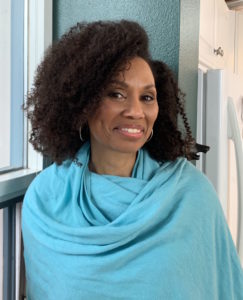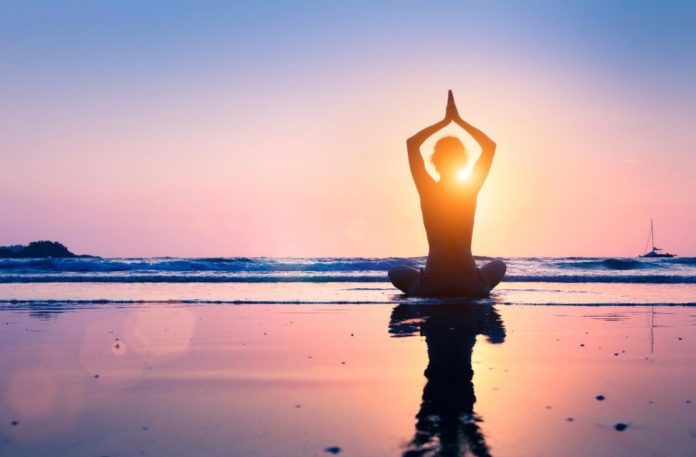By Terri Barnes
In military life, stress is part of every move, deployment, school transition, and career shift. Pamela Stokes Eggleston, a military spouse and yoga therapist, says the best preparation for handling stress on tough days is taking time for self-care every day.
Pamela writes and teaches about the benefits and practice of yoga and is the founder and director of Yoga2Sleep. After her husband was injured during a combat deployment, she says she had to relearn the importance of self-care. As a caregiver, she says, caring for her husband goes hand in hand with caring for herself.

“It’s not either-or. It’s both,” she says. “I’m here for my husband and I’m going to care for myself. I have time for meditation built it into my day, because I recognize I need that. When I’m healthy, I show up better for my husband when he needs me, and I’m happier. It’s a positive in all directions.”
Responses to stress are more important than the sources of the stress, says Pamela, and the practice of yoga increases a person’s awareness of those responses.
“Often, you can’t change what’s happening, you can only change yourself and how you’re reacting to outside stressors,” says Pamela. “It’s those reactions that are firing up the nervous system. Self-inquiry and reflection are helpful to discover how this stress is manifested in your life.”
The practice of yoga combines awareness of the mind and body through focused movement, meditation, and breathing. Even without taking a yoga class, however, it’s possible to apply some of yoga’s helpful concepts to daily self-care and stress management. Deep breathing is one example.
“You can’t change what’s happening, you can only change yourself and how you’re reacting… Self-inquiry and reflection are helpful to discover how this stress is manifested in your life.”
— Pamela Stokes Eggleston
“Taking a deep breath may seem overly simplistic, but it’s a very real way to disperse stress,” Pamela says. “Also, when you are focused on feeling the breath in your body, you have to be focused on the present moment. You can’t be focused on the future, and you can’t be focused on the past.”
Complications created by the pandemic have interrupted and altered life in countless ways, adding even more stress to military life and all its demands. Pamela says it’s natural to grieve what was lost, but it’s more effective to focus on the present than to wish for life to go back to the way it was.
“We’re using this term the ‘new normal,’ but we need to recognize that military life was never normal to begin with. There’s nothing normal about military life,” she laughs. “Instead, we can unpack what we feel and say, ‘I’m lamenting what was in the past and worried about the future.’ Then we need to come back to the present. If you’re focused on the past and future, you are not living in the present.”
Part of living in the present, she says, is looking for the benefits of adversity. Military families, she points out, know how to deal with change. They know how to use creativity and determination to make the best of any situation, even one that’s difficult or tragic.
“I’ve known people who died from COVID, and I know people who recovered from COVID, so I’ve seen both sides,” says Pamela. “It’s still possible to look at the blessing side of this. We can sit in what one of my friends calls the joyful discomfort and ask ‘What is the positive I can find, even in that discomfort?’”
Those positives can include personal growth, greater awareness, and compassion. Pamela also says it helps to recognize that military life teaches useful skills and qualities for navigating all kinds of uncertainty and upheaval.
“I need to have compassion for myself and for other people who aren’t like me, who see things differently from the way I do,” she says. “The military community is diverse, so we’ve learned how to handle some of this. But not everyone has lived this way, and we need to have compassion in that. This is what I believe America can aspire to be. Our differences and our diversity are what make us magnificent.”
Take Time for Self-Care
From her expertise as a yoga teacher and therapist, Pamela offers these self-care tips to recognize stress and manage its effects:
Feel Your Breaths. “Take five deep breaths and feel the breath in your body. Feeling and experiencing your breath creates space for self-inquiry. Ask yourself ‘Why do I feel this way? What am I doing to do about it? Why don’t I have compassion for myself or for someone else?’”
Listen to Yourself. “Pay attention to what is going on in your body and mind. A lot of times we don’t want to be curious about our pain, because it means facing something that might be wrong. We dull our pain, turn it off or trudge through it. Instead, be curious about what that pain means, explore the reasons, practice compassion for the pain you are experiencing.”
Get moving. “You need to move your body, because stagnant energy stresses us out. Sit out in the sunshine and breathe that fresh air. Go when no one else is out there and walk.”
Take Ten Minutes: “You don’t have to take a yoga class, but you can take ten minutes. When people say they don’t have time, I ask, ‘Does your bathroom door have a lock?’ You can sit on the floor of the bathroom and take ten minutes behind a locked door. Put your headphones on and meditate. We’re all busy, but there’s twenty-four hours in the day. Make time for what is really important.”
Accentuate the Positive: “I don’t believe in depletion or restriction. I believe in crowding out the bad stuff with good. Look at what you ingest, both in your diet and your energy. What are you feeding your body and your soul? Fill up with the good stuff.”
Terri Barnes is a military spouse and author of Spouse Calls: Messages From a Military Life, based on her long-running column in Stars and Stripes. She is also the editor of several award-winning books from Elva Resa Publishing.
More helpful ideas about self-care from Military Family Life:


